
A carillon ( KARR-ə-lon, kə-RIL-yən) is a pitched percussion instrument that is played with a keyboard and consists of at least 23 bells. The bells are cast in bronze, hung in fixed suspension, and tuned in chromatic order so that they can be sounded harmoniously together. They are struck with clappers connected to a keyboard of wooden batons played with the hands and pedals played with the feet. Often housed in bell towers, carillons are usually owned by churches, universities, or municipalities. They can include an automatic system through which the time is announced and simple tunes are played throughout the day.

Sather Tower is a bell tower with clocks on its four faces on the campus of the University of California, Berkeley. It is more commonly known as The Campanile for its resemblance to the Campanile di San Marco in Venice. It is a recognizable symbol of the university.

The Netherlands Carillon is a 127-foot (39-m) tall campanile housing a 53-bell carillon located in Arlington County, Virginia. The instrument and tower were given in the 1950s "From the People of the Netherlands to the People of the United States of America" to thank the United States for its contributions to the liberation of the Netherlands in 1945 and for its economic aid in the years after. The Netherlands Carillon is a historic property listed on the National Register of Historic Places as part of Arlington Ridge Park, which is part of the George Washington Memorial Parkway. It is owned and operated by the National Park Service.

Harkness Tower is a masonry tower at Yale University in New Haven, Connecticut. Part of the Collegiate Gothic Memorial Quadrangle complex completed in 1922, it is named for Charles William Harkness, brother of Yale's largest benefactor, Edward Harkness.

The Burton Memorial Tower is a clock tower located on Central Campus at the University of Michigan in Ann Arbor at 230 North Ingalls Street. Housing a grand carillon, the tower was built in 1936 as a memorial for University President Marion Leroy Burton. This carillon is the world's fourth-heaviest, containing 53 bells and weighing a total of 43 tons.

Washington Park is a park in Springfield, Illinois, listed on the National Register of Historic Places. Located at 1400 Williams Boulevard, the park features walking trails, a botanical garden, large duck pond, rose garden, carillon, and carillon concerts. The park was purchased for city use in 1900, and construction began in 1901. Substantial drainage and dredging were required to turn the wetland portions of the future park into ponds and grassy space. Washington Park is operated by the Springfield Park District.

The Municipal Group of Springfield, Massachusetts, United States is a collection of three prominent municipal buildings in the city's Metro Center district. Consisting of a concert hall, City Hall, and a 300-foot-tall (91 m) clocktower, the Group is a center of government and culture in the city.

The Royal Carillon School "Jef Denyn" is a music school in Mechelen, Belgium, that specializes in the carillon. It is the first and largest carillon school in the world. The Belgian government defines it as an "International Higher Institute for the Carillon Arts under the High Protection of Her Majesty Queen Fabiola". The school has trained many of the foremost carillonneurs of the twentieth and twenty-first centuries and houses a rich archive and library.

The Carillon in Berlin-Tiergarten is located in a freestanding 42-metre-tall (138 ft) bell tower next to the House of World Cultures, near the Chancellery in the northeastern part of Berlin's central Tiergarten park. It contains a large, manually played concert carillon, comprising 68 bells weighing a total of 48 tonnes (106,000 lb) connected to a keyboard spanning 5 and a half fully chromatic octaves; the largest bell weighs 7.8 tonnes (17,000 lb). The carillonneur sits in a playing cabin in the middle of the bells and plays with his fists and feet on a baton-and-pedal keyboard. The purely mechanical action makes it possible to play all dynamic gradations, from very soft to very loud.

Loughborough Carillon, locally known as the Carillon Tower, is a carillon tower and war memorial in Loughborough, England. It is in Queen's Park, and is a well-known landmark, visible from several miles away. It is 152 feet (46 m) high.
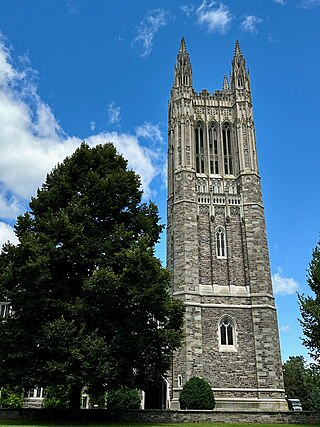
Cleveland Tower is a bell tower containing a carillon on the campus of Princeton University. It was designed by Ralph Adams Cram and is one of the defining Collegiate Gothic architectural features of the university's Graduate College. The tower was built in 1913 as a memorial to former university trustee and U.S. President Grover Cleveland. A bust of the former president is the centerpiece of the grand chamber at the tower's ground level.
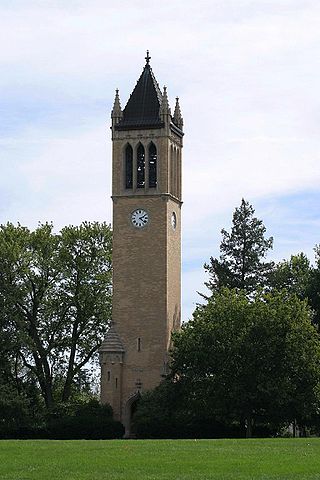
The Iowa State University Campanile is located on Iowa State's central campus, and is home to the Stanton Memorial Carillon. The campanile is widely seen as one of the major symbols of Iowa State University. It is featured prominently on the university's official ring and the university's mace, and is also the subject of the university's alma mater.

The 72-foot Olinger Tower contains the Charles S. Hill Memorial Carillon, the oldest authentic carillon in Colorado. From 1961 through 1999, the Hill Carillon was the only manually played carillon in Colorado.
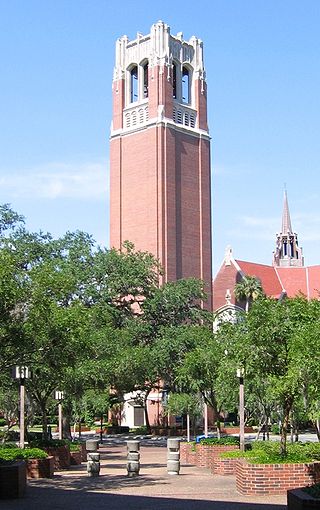
The Century Tower is a 157-foot-tall (48 m) bell tower containing a carillon in the center of the University of Florida campus in Gainesville, Florida, United States.

The McFarland Memorial Bell Tower is a 185-foot (56 m) bell tower located on the South Quad of the University of Illinois Urbana-Champaign. The tower was approved by the University's trustees in 2005 and built in 2008-2009. It was designed by Fred Guyton of Peckham, Guyton, Albers & Viets. The carillon has 48 bells.
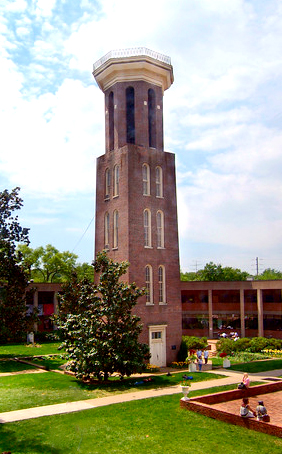
The Belmont Tower and Carillon is an iconic structure on the campus of Belmont University in Nashville, Tennessee. The Tower is listed in the National Register of Historic Places as part of the Belmont Mansion registration and is prominently featured in the university logo. The current Belmont University Tower and Carillon chimes each hour from 9:00am–8:00pm.
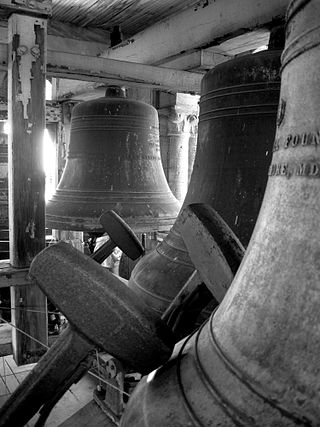
The Senior Memorial Chime, known more commonly as the Altgeld Chimes, is a 15-bell chime in Altgeld Hall Tower on the central campus of the University of Illinois Urbana-Champaign, in Urbana, Illinois, United States.
Campanology is the scientific and musical study of bells. It encompasses the technology of bells – how they are cast, tuned, and rung – as well as the history, methods, and traditions of bellringing as an art. Articles related to campanology include:


















